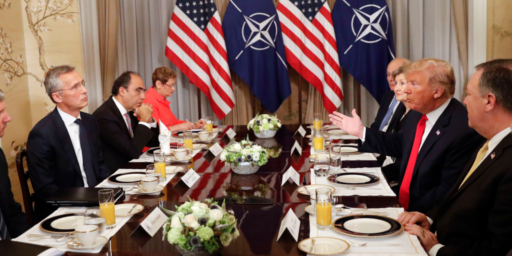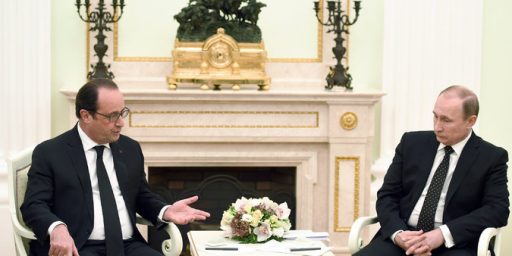Germany Promises Expanded Military Role But Its Military Isn’t Ready
Germany's new defense minister has promised a more robust role but lacks the ability to back her words with action.
Germany’s new defense minister has promised a more robust role but lacks the ability to back her words with action.
The Economist (“Chinks in the armour: Is Germany able to give its allies more military help?“):
URSULA VON DER LEYEN, Germany’s first female defence minister and a possible successor to Angela Merkel as chancellor, likes a good photo opportunity. One that backfired recently had her standing under a dramatic sky with an army transport aircraft in the background, gazing into the distance as though on the look out for geopolitical derring-do. The derision was instantaneous. The image matched both her ambition and the vision she outlined in January of Germany’s armed forces playing a bigger role in international crises. Given post-war Germany’s radical pacifism, that was controversial.
She is now at risk of failing her first two practical tests. Last month she dispatched German army volunteers to Africa to help in the struggle against Ebola. And although Germany has not joined its allies in bombing the Islamic State (IS), she sent weapons to the beleaguered Iraqi Kurds. Sensing another photo-op, she boarded a Transall transport plane and flew to Iraq for a ceremonial delivery. But the anti-tank weapons, rifles and machine guns had not arrived, nor the German trainers, because the planes carrying them (one of them leased from the Dutch) were grounded en route for repairs. Another Transall, bound for Senegal with the German volunteers to fight Ebola, was stranded with technical difficulties in the Canary Islands.
The problems extend far beyond unreliable transport aircraft. Reporting to parliament last month, inspectors said that only a fraction of Germany’s helicopters, submarines and tanks are fit to be deployed. The problem is a lack of spare parts. Ordering and making them will take time. On September 30th another blow came when it emerged that technical defects affecting the air force’s Typhoon fighter jets had been found.
Mrs von der Leyen has some explaining to do. Airbus should finally deliver the first of its new A400M aircraft to replace the old Transalls this autumn, she said. The other maintenance problems, she claims, date back to her predecessors and have come to light because more is being asked of the army.
All true, but the question remains whether in a crisis Germany could meet its obligations as part of NATO. With Russia’s aggression in Ukraine on their minds at their summit in Wales last month, the 28 allies renewed their pledge to commit at least 2% of GDP to their armed forces. Germany has steadily cut its defence budget. It spends only 1.3%, putting it 14th among alliance countries.
The shoddy state of the armed forces is now Mrs von der Leyen’s biggest problem. It is causing tension within the grand coalition of the centre-right camp (to which she and Mrs Merkel belong) and the centre-left Social Democrats. Their parliamentary leader, Thomas Oppermann, accused Mrs von der Leyen of poor management but simultaneously ruled out spending more. Another senior Social Democrat, Thorsten Schäfer-Gümbel, suggested that she should do more work and “fewer photo shoots”.
Germany has been ridiculed for years by American, British, and French security experts for its parsimonious approach to defense. By far Europe’s biggest economic power, it’s punching well below its weight.
Regardless, I’ve long defended Germany, in that, unlike the Brits and French, their underwhelming contribution to NATO was at least matched by a modest set of foreign policy ambitions. The Brits and French have cut back their defense spending almost as much—to the extent they couldn’t even undertake a tiny mission like the air campaign over Libya without massive American assistance—but continue to have superpower ambitions for policing the world. Germany, by contrast, has basically seen its military mission simply the protection of its homeland and that of its NATO allies.
If Germany is serious about being part of a global police force, then it’s going to have to meet the NATO minimum of 2% GDP for defense. Thus far, it’s not looking like there’s the will to do that. In which case, perhaps they should go back to their previous announced foreign policy.







Given the current state of the Bundeswehr, one wonders if Germany could even meet the latter obligation.
Not really relevant, but wow, “von der Leyen,” now that’s an aristocratic name. The House of Leyen goes back to the 12th century.
Everybody in Germany new the Transall story for years, what really woke them up was that the rest of the Luftwaffe isn’t in any better shape, even their relatively new Eurofighter has less than 50% of airplanes combat ready. Similar numbers for nearly all equipment throughout the Bundeswehr, and that force isn’t that big to begin with.
I love the black jacket. Does it make her the Fonzi of Freiheit?
@Mikey:
So is thee something wrong with this? Perhaps we have something to learn from Germany.
@Ron Beasley: Fielding a rump army that can barely defend its own borders is a nice luxury to have, made possible by America basically paying the way for German national defense since 1945.
I dunno. I think of Germany like the Incredible Hulk. You really don’t want to want to get that mild mannered weakling angry. As I’ve said, right now Germany has an army-but we know from past experience that they could have an ARMY.
Frankly, I’m OK with Germany having a small military. But I have to admit, with the looming Russian threat, maybe it’s time we prompt Germany to Hulk up.
@stonetools:
I don’t know if they have it in them anymore. They’re scared to death of themselves in that context.
Understand that everyone born after WW2 has had the history of the Nazi era drilled into them all through school. It’s only very recently that overt displays of patriotism have become acceptable, and then only at certain times (to wit: the recent World Cup victory). They don’t even sing an entire verse of their national anthem, because it is considered too nationalistic.
I have no doubt if Germany put sufficient money and effort into fielding a world-class military, it would field one of the best. I just don’t believe their national mindset will ever allow it.
@Mikey:
So who’s the idiot in that scenario: the US or Germany?
@Mikey:
Look, it’ s not as if the US defended Germany for the sake of Germany — rather, the US defended Germany in large part because it considered Germany as in the American imperium’s zone of influence, and because Germany was its forwardmost staging post against the Red Army. America maintained a large land and air force in Western Europe so that America could be powerful. We didn’t just do it as a favor out of the innate goodness of our hearts.
@Rafer Janders: That’s true, no doubt, and we’ve never tried to hide it. But it doesn’t dispute the effect on Germany’s view of national defense and what it sees as necessary to field an effective military.
“Germany has been ridiculed for years by American, British, and French security experts for its parsimonious approach to defense. By far Europe’s biggest economic power, it’s punching well below its weight.”
And while the great sophisticates of the world have had a jolly time ridiculing Germany for refusing to pour money into defense, it has taken that money and made itself the one Western economy that is booming. Maybe it turns out if you don’t shovel trillions of dollars to defense contractors you can actually spend that money on your citizens. No wonder the other countries make fun of them — can’t have that sort of thinking catching on!
@wr:
Shhh-American conservatives don’t want the American people to hear this…
Meanwhile possible infrastructure projects in the USA go don’t get funded because “we can’t afford it” and “government needs to go on a diet…”
Eh, that’s simplistic. While I completely agree that the US spends too much on military and defense spending, to say that’s why the German economy is in such great shape doesn’t cover the whole story. For example, US GDP has grown significantly faster than Germany’s for going on two decades (including the last few years).
http://www.tradingeconomics.com/germany/gdp-growth
http://www.statista.com/statistics/188165/annual-gdp-growth-of-the-united-states-since-1990/
GDP is obviously not a be all measurement either. My only point is that there’s something between the US’s military on steroids spending and Germany’s minimal (especially with such a nasty threat so much closer to them) spending that should be achievable without necessarily hurting the overall economy, and the German economy isn’t necessarily “booming”. It weathered the 2008 recession better, (particularly in terms of job losses), but it’s suffering from the austerity issues most of Europe is and is probably in worse shape than the US economy is today.
Heck, 2% isn’t even THAT high of a demand, comparatively, and stimulus is stimulus (as pointed out–just like we could spend less on military and more on infrastructure and social services, they could do the reverse). The US spends well over 4% on it’s military (that it admits to, more once you count all the “not main Pentagon budget” crap). Us at 3+% and more Europeans at 2+% would probably be good for everyone, economically and world power wise.
http://data.worldbank.org/indicator/MS.MIL.XPND.GD.ZS
The problem with using GDP to gauge the strength of an economy is that it overvalues the monopoly money people on wall street generate. It looks good on paper but can be gone overnight when “the bubble” burst again. Adding 20 billion to the GDP with the latest internet IPO is not the same as rebuilding all of Detroit’s manufacturing capability for one-tenth of that money.
@Mu: I’m not sure how GDP calculation does that–those kinds of investments aren’t counted as part of GDP. Buying Wall Street financial products is classified as saving, not capital investment.
I would have thought that in light of the Russian movements that Germany would get going with expanding and building their armed forces. Let’s see if they change their tune when Russia heads into western Europe countries. I read a book long ago: “Germany Will Try It Again”, in which the author said that Germany will try and take back some of their territory.
“To Keitel and Rommell: a Ms. Der Leyen needs to talk to you.”
@Tyrell: Wouldn’t worry about Germany rolling tanks again. Germany’s third attempt to subjugate the rest of Europe, this time with the Euro, is going quite well for them.
I doubt that Germany has so deeply forgotten its military traditions to require input from the US. I doubt that there is much risk of waves of T-34’s rolling into Berlin. Actually, more and more I think that the Cold War fears of attacks by asiatic Russian hordes into Europe might have had a bit of fearmongering for US domestic consumption by demagoguing politicians.
Naturally, I acknowledge that Putin is the worst, most evil person on earth; a Hitler multiplied by Saddam Hussein. However, I can see where he might have gotten the idea that the west wanted to strangle his country when NATO expanded into three countries on his border and the government of Ukraine was overthrown in 2012.
The almost total capture of America’s government and public discourse by militarism represents our neglect of Eisenhower’s warnings.
I take it that Herr Oppermann did his internship with the Republican Congressional Caucus?
(Cue and outraged comment from Jenos, edmundo, or Eric in 4…3…2…1…)
@Mikey: “Buying Wall Street financial products is classified as saving, not capital investment.”
IIRC, all monetary transactions count. Other measures worry about ‘consumption’ vs. ‘investment’.
And please note that German did what it did while absorbing East Germany.
@Barry: GDP specifically counts only capital investment (i. e. spending on actual equipment or physical plant). Money invested in financial instruments like stocks is only accounted for in GDP when it is actually spent as capital investment. The Wiki on GDP explains why: